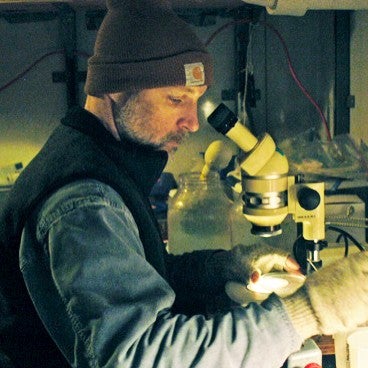Investigator(s)
Abstract
The edge of the shallow continental shelf (called the ‘shelf break’) in the Beaufort Sea is vulnerable both to direct impacts of ongoing climate change and to indirect impacts that may result from increased human activity in response to new opportunities associated with ocean warming and sea ice reduction. Beaufort Sea shelf break upwelling may be increasing in frequency in response to recent large-scale atmospheric changes, potentially increasing the importance of the shelf-break environment for a range of upper trophic level animals. This grant will support research to increase our understanding of the importance of the region to upper trophic levels such as beluga whales, seabirds, and seals, provide a mechanistic understanding of the linked atmosphere-ocean- plankton-predator system, and predict future consequences and impacts of environmental change on this system.
A substantial communications program built upon long-standing, well-established relationships between the researchers and Alaska North Slope communities and subsistence organizations is planned both to coordinate the planned sampling and to convey the results of the research back to the communities. Information will be disseminated locally before and during two research cruises using a range of media including daily email reports, Facebook pages, blogs, interviews on local radio stations, and flyers. A comprehensive project report, a summary report written in straightforward English, and a poster describing results will be disseminated to the North Slope communities. Project members will also present results of the research in local lecture series or to interested local organizations. Involvement of a K-12 teacher in at least one of the cruises is planned. Both cruises will have the participation of a local community observer who will communicate directly with local communities during the cruise and share local knowledge with the science party.
The Beaufort Sea shelf break experiences frequent upwelling of deep, nutrient rich basin water onto the shelf. Such upwelling is not only a short-term source of heat, salt, and nutrients, and a mechanism promoting elevated primary production (production response), but it also transports populations between ocean regions and depth strata or regimes (physical response), potentially modifying ecosystem structure and availability of zooplankton and fish prey to upper trophic level consumers. The Beaufort Sea shelf break is a domain of enhanced abundance of upper trophic level animals, presumably in response to elevated availability of their prey. Here we propose to explore and identify the mechanisms linking broad-scale atmospheric forcing, ocean physical response, prey-base condition and distribution, upper trophic level animal aggregations, and climate change along the Beaufort Shelf break. Our overarching hypothesis is that atmospherically-forced (wind-induced) upwelling along this shelf break leads to enhanced feeding opportunities for intermediate links in the pelagic ecosystem (zooplankton, forage fish) that in turn sustain the exploitation of this environment by animals such as beluga whales, seabirds, and seals. This hypothesis will be addressed using a combination of ship-based fieldwork, long-term moorings equipped with physical and biological sensors, and syntheses of retrospective and projected model output and longer-term data. The distributions, abundances, condition, and biology of multiple trophic levels will be described within the context of the dynamics of the physical environment to expand our understanding of trophic linkages and the importance of shelf-break upwelling to that system. Physical and biological model output and retrospective data will be synthesized with the mechanistic understanding gained during the field program to retrospectively characterize wind-driven upper trophic level ecosystem variability and predict how the ecosystem may respond to future projections of these atmospheric drivers and ice-ocean conditions.
Sponsor
National Science Foundation
Award Amount
$565,065
Begin and End Dates
1-October-2016 === 30-September-2019

